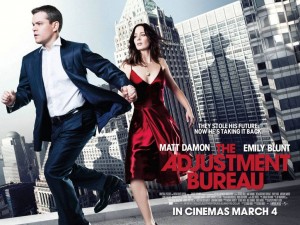
Some years ago I bought the first book of Isaac Asimov’s Foundation series, made it to approximately page 40 and tossed it aside. The writing was unimpressive, but not so bad that I would have normally opted to leave it unfinished. The problem for me was that I was not willing to suspend my disbelief so as to accept the author’s premises. I did not see the point in exploring something so patently untrue, and if his prose was going to be that insipid, with nothing especially arresting about the early part of the plot, then the opportunity cost was too high. I felt much the same as I watched The Adjustment Bureau, though I did sit through until the end.
In this film’s particular world, the human race has been guided through the centuries, off and on, by an entity referred to as The Chairman who has in his employ a number of beings, human in appearance, with extraordinary powers. The Chairman took the human race from barbaric tribalism to the height of the Roman Empire before deciding to allow us to make our decisions for ourselves. What followed were the Dark Ages, so this benevolent dictator assumed control once more and guided us through the Renaissance and the Enlightenment up to about 1910, whereupon we were given one more chance to be free. We produced WWI, The Great Depression, WWII and brought the world to the brink of nuclear holocaust, so we lost our freedom yet again, presumably for good this time.
The plot has to do with a politician, played by Matt Damon, who feels compelled to be with a piece of brunette pulchritude, played by Emily Blunt, and The Chairman and his… angels I suppose we could call them… who use their powers and more than a couple threats to keep the couple apart. The reason for this is that their being together will mess up The Plan which The Chairman wrote and which keeps us from annihilating ourselves. Fellow libertarians will immediately see why I simply cannot suspend my disbelief.
The film has been touted as an exploration of Free Will versus Determinism. It’s not. The humans in the movie all have free will, but their wills are subverted when deemed necessary by higher powers. I don’t see how any film could be a true exploration of this topic. Either we have free wills or we don’t, and if we don’t something has done a damn fine job of disguising that fact. The Adjustment Bureau is better seen as a moral dilemma for empathetic democratic socialists everywhere, the kind who think a prehensile government is necessary for peace and stability but who have just come to the realization that government will go so far as to shoot dissenters in order to enforce its laws.
The stamp of this modern liberal outlook is everywhere, from the premise itself to the protagonist, who is meant to lead the human race to greater things. What sort of a politician is this chap? The sort who votes for Sarbanes-Oxley and urges companies to develop alternative energies even when they won’t be profitable. I cordially invite anyone who sees in those policies any potential to uplift the human race to take a course on economics at the Mises Academy. In the meantime, let’s just say I understand how this may be a compelling dilemma for some – the necessity of sacrifice of personal happiness and freedom for the greater good – but the only dilemma for the Austrian-influenced libertarian is whether to yawn or roll his eyes. I went first with the latter, then with the former.
As a piece of filmmaking, all philosophy, economics and politics aside, the movie is a more mixed bag. The chemistry between Damon and Blunt is remarkable, and Mr. Damon does not miss the opportunity to once again demonstrate his admittedly impressive flirting skills (I dabbled in that art in my younger days and can recognize talent when I see it). I think that only a complete absence of females on the set could keep Private Ryan from working his charm. Despite his politics, his charisma coupled with a political speech the likes of which Americans from all parts of the political spectrum would love to see delivered make him a character we can care about.

(MILD SPOILERS)
It’s a shame, therefore, that he is so feckless. The only action he takes that has any repercussions is his pursuit of the woman who has captured his heart, supernatural threats be damned. He needs a traitorous act from one of the angels just to deliver some basic information to him. He requires more sympathetic interventions of this sort as the movie goes on, or absolutely nothing of interest would happen. Even the final resolution is brought about by higher powers. Matthew and Emily spend the film clinging to a raft tossed about by the whims of the ocean. Their only real part to play is choosing to stay on the same raft together, thus angering Neptune.
(END OF SPOILERS)
It is the angels, therefore, who drive the plot, not Matt Damon’s character. And yet, it is Damon’s character who is presented as the protagonist and who spends the vast majority of the time on screen. This might be seen as fitting for a film that argues we are not the masters of our own destiny, but it is a real problem for the film’s entertainment value: a protagonist with about as much say in his own direction as a weather vane. It would have been more interesting if Damon had come upon some artifact that gave him powers like the angels so he could start messing with The Plan. Or perhaps the story should have been told exclusively from the perspective of Damon’s angel informant, who makes real decisions that have real effects (even better would be a story about angels who try to intervene to help us and make things worse than they already were).
As it is, the perspectives of the angels that we do get serve to sap the story of energy. The more we see of them, the less of a menacing force they become (some might argue that they are benign caretakers, but this is no reason not to fool the audience, at least for part of the film, into thinking they are menacing. Indeed, they make enough threats to Damon to seem so). When the agents assigned to Damon are having trouble with him, a higher ranking agent is assigned. What is the name of this higher ranking agent, who, we are meant to believe, has been around for many centuries guiding (controlling) the human race? Nebuchadnezzar? Zoroaster? No, it’s Thompson. This is not a name given for the benefit of modern humans; this is the name by which the angels refer to him among themselves. Thompson. You know, of the Ur Thompsons.
The story faces a logical obstacle early on, which is how to allow the informant to give information to Matt Damon without alerting the semi-omniscient Chairman of his treachery. The convenience fabricated by the screen writer is that water blocks his special powers, so they meet on a river boat. Whether it is the hydrogen or the oxygen or some emergent property when they are bonded we are not told, but it does seem a little too convenient.
The futility of the protagonist’s actions is a serious flaw for the movie; the other points are minor. Somewhere in between is the explanation of choice and guidance and how the angels operate, because for the Austrian and libertarian mind every point is easily refuted so that the whole thing crashes down from the weight of its own poor logic. A few brief sentences and a handful of images of the angels’ notepads, which show us possible paths and interconnections with other people, are enough to give a sensible person an idea of the overwhelming enormity of the task.
Perhaps that is the movie’s best point: as a bit of low hanging fruit to be refuted, to show people, as Hayek might say, how little they really know about what they imagine they can design. And that goes for angels too.















